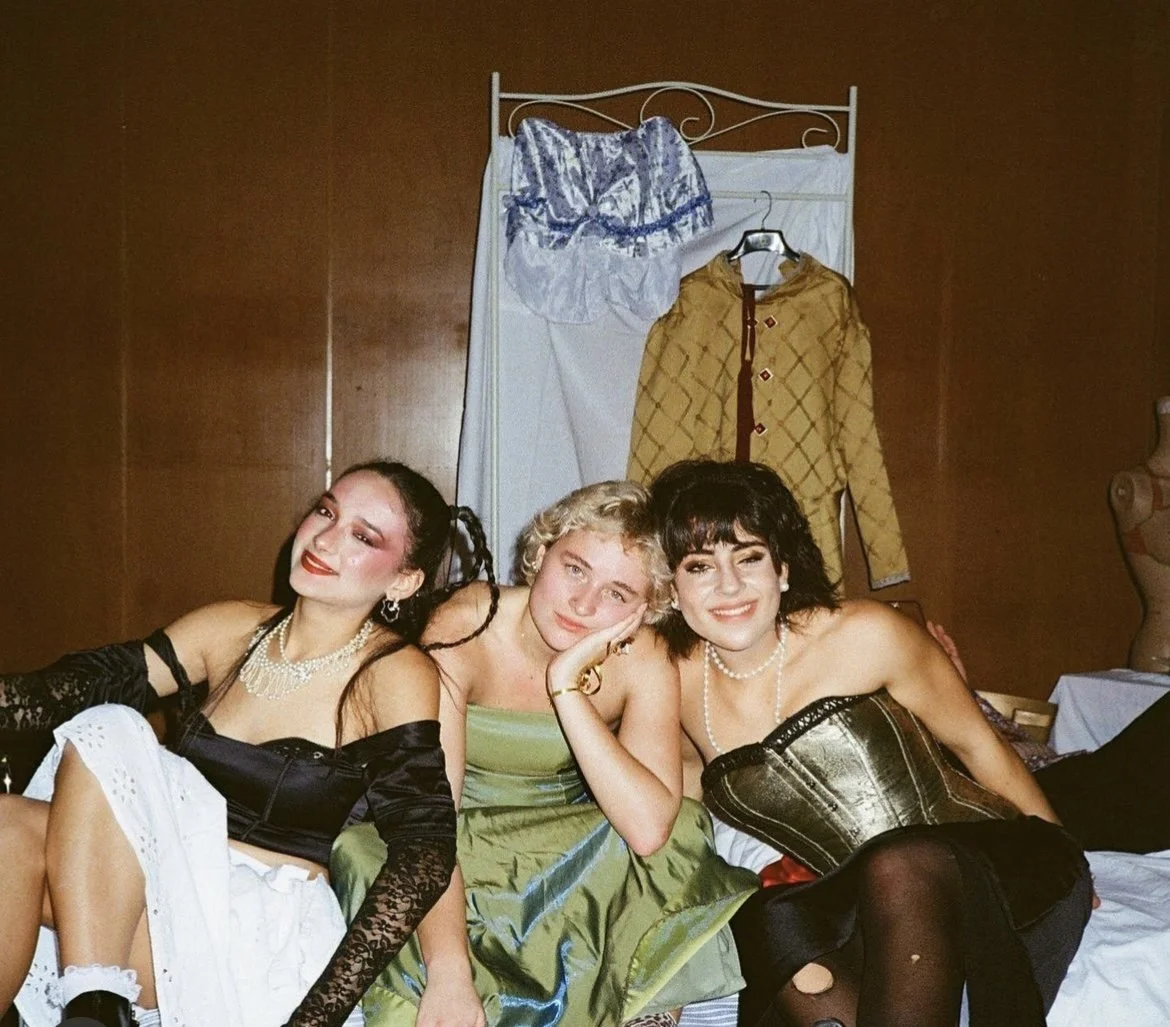Bilingual, Welsh and Queer: Talulah's Ethereal Odyssey
October 10 | Written By Gemma West
In the enchanting realm of contemporary Welsh music, bringing her bilingualism and Welsh heritage to her musical prowess, emerging artist Talulah captivates listeners as a true enchantress, weaving gossamer threads of sound and transcending linguistic boundaries. At a mere 22 years of age, Talulah's mesmerising vocals resonate in both English and Welsh, holding a reflection of Wales' cultural duality, whilst evoking a sense of ethereal mystique reminiscent of whispered secrets shared between ancient forests and moonlit waters. Poised to make her mark in a music industry where authenticity and innovation reign supreme, I delve not only into what cultivates and inspires Talulah’s enchanting sound, but also into the resurgence of Welsh music and the allure of bilingualism in today's mainstream music scene.
Bilingualism - a creative tapestry?
Bilingualism or multilingualism, is not just a linguistic phenomenon of conversation but a creative tapestry, where the interplay of languages adds depth and nuance to music in innovative and transformative ways. Just as spoken language expresses feeling, passion, zest, pain and lust in a thousand different ways all over the world, the same can be applied to the expression of song. The powerful dance of language interplay in music, has been pioneered in the mainstream most recently by the Colombian-American neo-soul star Kali Uchis on an international stage, in hits like ‘Telepatia’ and ‘Endlessly’, where talent agents and music giants discouraged her honing in on her spanish roots to avoid narrowing her audience reach. Whilst there’s still progress to be made, we’re now starting to see a mass eclectic mix of bilingual music across genres, spanning from rap to funk to hip-hop, some of my favourites including: Rejjie Snow’s snapshots of french in tracks like ‘Mon Amour’ or ‘Désolé’, Burna Boy’s fusion of Yoruba on his hit ‘Last Last’, Sofía Valdés’ effortless mosey between Spanish and English on her latest album, or CKay’s smooth fusion of English and Igbo on the world's most Shazamed track: ‘love nwantiti’.
Welsh music has a storied history, echoing through the valleys and resonating across the globe. From the soul-stirring hymns of Treorchy Male Choir to the poetic folk songs of Mary Hopkin, Wales has long been a cradle of musical talent. However, the Welsh language, with its lyrical richness and poetic cadences enriched by culture, remained somewhat veiled, a secret treasure for those who understood its power.
In recent years, artists like Gwenno and Gruff Rhys have championed the Welsh language on international stages. Yet, it's the emergence of a new generation of artists like Talulah that herald a renaissance in Welsh music. Bridging the gap between linguistic tradition and modernity, whilst proving that bilingualism is not a barrier but a powerful vehicle for creative depth in song, young Welsh artists are continuing to pursue cultural connectivity within the UK and beyond.
Talulah: cultural duality and bilingualism
Drawing inspiration from a palette as diverse as it is captivating, Talulah's musical cosmos is illuminated by the likes of Zsela, Cate le Bon, Lleuwen, and the indelible AMORE. Her sound is a spell cast from a proud Welsh heritage, manifesting sonically, linguistically and aesthetically in her artistry. Transporting listeners to a realm where language is no barrier, as her voice glides seamlessly between the ethereal, soft melodies of English and the emotive cadence of Welsh, I interviewed Talulah to ask her exactly how she achieves her sound:
As a listener, your music has an ethereal sound, spelled with emotions which feel both innocent and vulnerable: from what place and experiences are you drawing from when you create?
I started out writing from pretty specific personal experiences. My experiences as a queer person have come into songwriting. Initially, I was just writing for me - I wrote my first single ‘Byth yn Blino’ back in 2018. I didn’t intend on sharing it with anyone, it was just there as a vault for documenting the emotions I had as a newly out queer person. But then I figured there wasn’t a lot (if any) Welsh language explicitly queer music, and I wanted to get the ball rolling.
Recently, though, I’ve loved writing songs about things I absolutely have not experienced. It’s created this incredible new space for imagination and creativity. I love it. For example, I have a few unreleased songs which express certain emotions / ways of being I’ve never felt, and never experienced. In many ways they are sort of hopeful songs for me? A type of motivation for the person I’d like to be, or experiences I would like to have - but without being preachy.
How does your bilingualism influence your songwriting process? Do you find that certain emotions or stories are better conveyed in Welsh versus English, and vice versa?
Bilingualism is definitely at the forefront when it comes to my songwriting process. It’s full of back and forth translation from things I’ve jotted down in my notes app. I’ve thought about your second question quite a lot whilst writing actually. It’s kinda like when people ask a bilingual person what language they dream in and stuff like that. For me, I feel super lucky to have the choice of which language to use. Sometimes I find myself having written a song in English, but then I find that the Welsh version just sounds more poetic. I wouldn’t say I feel pressure to write in Welsh solely due to its status as a minority language, it just comes naturally and it’s integral to both the creative process and my identity. I’ve been enjoying the process of weaving in and out of both languages. I don’t feel like one necessarily holds more authentic expression for me, because that ebbs and flows. What’s really lovely though is that I produce music with Llŷr Pari, who is a Welsh speaker. So I’m super lucky to work with someone who understands both the importance of the Welsh language in my music but also reflecting the daily intimacies of bilingualism / speaking a minoritised language.
The music industry is evolving rapidly. As an up-and-coming artist, how do you see your music contributing to this evolution, especially as a bilingual artist?
I would of course looove to see bilingual music embraced more by mainstream media. But for now, I’m just going to keep doing my thing - writing in Welsh, in English, in whatever feels good,whatever feels right. I just have fun with it. One of my favourite artists is ROSALIA - I love the way she has crafted an insanely impressive discography of non-English music and has played with traditional cultural sounds. This inspires me in so many ways - not only to sing in whatever language feels right, but to play around with tradition, poke it, rip it up and put it back together in new ways.
You're not just a singer, but a multifaceted force in the creative arts world! I know you're involved in podcasting, producing and djing... What brought you to bringing out your own tracks at this particular point in your life?
I started out as a DJ, playing at queer nights at uni and as a member of ‘Playtime’, a dj collective for marginalised genders. I’ve always been a singer first, though. My life growing up revolved around singing in the côr in things like the Eisteddfod. What’s different now I guess is that I’ve come more into my own. It’s a lush feeling to finally feel confident enough to sing with a full côr, without someone else filling in the harmony or top line for me. Producing tracks and writing my own songs has been cathartic and energising in that way.
Talulah's music is an otherworldly journey into a dreamscape that beckons us with her dulcet tones, delicate yet haunting - cradling emotions that lie just beneath the surface, whilst offering a sonorous haven for introspection. Both her and her music are impossible not to fall in love with: unapologetic, transparent, inviting.
Her emergence as an artist and growing popularity in the creative scene, mirrors Wales' own transformational blend of traditions meeting innovation across the creative scene, whether that be Adam Jones’ emerging fashion collection upcycling beer towels and chintzy pub artwork from local welsh towns, or The Royston Club (hailing from North Wales) taking over the alt/indie band music scene. As the Welsh creative scene resonates with a new wave of artists who are unafraid to blend tradition with innovation, Talulah stands at the vanguard of this movement. Her evocative and poetic tracks not only resonate with international audiences, but also invigorate Welsh cultural heritage, breathing beautiful new stories through its rich language.
An intoxicating symphony of sound, Talulah is one to watch on the global music scene.




